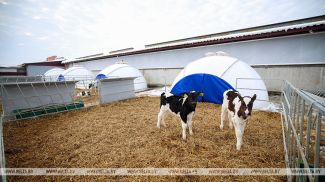DUSHANBE, 17 September (BelTA) – Belarusian President Aleksandr Lukashenko took part in the Heads of State Council of the Shanghai Cooperation Organization on 17 September, BelTA has learned.
This year the organization celebrates its 20th anniversary. The SCO summit in Tajikistan took stock of the progress made by the organization over the past 20 years and discussed the state and prospects of multilateral cooperation. Aleksandr Lukashenko highlighted several areas of work that he believes require close cooperation of the member states.
According to the president, the Shanghai Cooperation Organization will soon be put to a historical stress test, perhaps the most serious one in its entire 20-year history.
1. Accelerate integration of global development strategies
“The SCO is one of the world's largest regional organizations. This status gives resources and opportunities not to play by the rules dictated by external forces,” Aleksandr Lukashenko said.
The president went on saying that the member states of the organization are capable of maintaining peace at home and defending a multi-polar and fair world order. According to the president, to achieve these goals, it is necessary to accelerate the integration of global development strategies, to expand cooperation in the field of security, to step up joint efforts in the field of infrastructure, industrial parks and high technologies.
2. Intensify cooperation in healthcare
Aleksandr Lukashenko noted that the coronavirus pandemic remains a serious threat, therefore it is necessary to combine efforts to overcome the aftermath of the pandemic. “We need to team up now more then ever and set up an alliance in the field of healthcare,” Aleksandr Lukashenko said.
In his opinion, the SCO member states need to intensify cooperation in the production of vaccines and medicines, and not only against coronavirus.
3. Respond to present-day challenges
According to Aleksandr Lukashenko, the pressing global challenges such as drug trafficking, terrorism, extremism and illegal migration are of Belarus' concern as well.
Belarus upheld the decision initiated by Tajikistan to set up the SCO anti-drug center.
Aleksandr Lukashenko expects that the document on the SCO observer status adopted at the summit will allow broad participation of Belarus and other states in joint efforts to maintain security and counter separatism and extremism.
4. Create a legal system to combat cyber threats
The president called cyber attacks and manipulation of public opinion via the internet one of the most dangerous challenges for the SCO countries. “They threaten the security of state institutions, public interests, as well as human rights,” the head of state noted.
According to him, one of the problems in this context is the absence of an international legal system that establishes norms and rules of conduct in this area. The development of an appropriate international platform will make it possible to resolve these issues, Aleksandr Lukashenko believes.
“The global data security initiative proposed by Chinese partners, as well as Belarus' earlier proposal to create a ‘digital good-neighborhood belt' may become important steps towards this goal,” he added.
5. Develop a common transport space
The head of state believes that the further development of the SCO common transport space holds a lot of promise and will help build reliable logistics infrastructure.
“By joining efforts, we will be able to effectively link Europe with Asia, expanding the route network and creating the necessary conditions for transit,” the president said. Belarus and China are already actively working in this direction, the president added.
The head of state also spoke about the need to develop railway transportation. “Railway transport proved to be the most resistant to various kinds of restrictions in the context of the pandemic,” the Belarusian leader stated.
6. Promote renewable energy and nuclear power
Aleksandr Lukashenko noted that the international community is now greatly concerned with environmental issues, global warming, the imbalance of natural systems and the depletion of resources.
“We believe we should step up cooperation in renewable energy and nuclear power,” the head of state said.
7. Use national currencies in international trade more often
“Belarus resolutely and consistently supports the SCO proposals to expand the use of national currencies in trade and finance,” the president said.
In his opinion, the ongoing developments in the world have exposed the increasing vulnerability of those countries that fully rely on one well-known currency. “This does not only deprive us of competitive advantages in economy and finance, but also threatens national security. Moreover, the reliance on one currency is increasingly being used as a weapon,” Aleksandr Lukashenko said.
8. Help rebuild Afghanistan
Aleksandr Lukashenko called the SCO a unique platform for discussing problems in Afghanistan that has observer status in the organization. “We all respect the sovereignty, independence, territorial integrity of this state. We adhere to the principles of international law on non-interference in domestic affairs. The involvement of Afghanistan in the development of regional transport, logistics and energy infrastructure is critically important for linking Central Asia with South Asia, as well as for better communication within the economic space of the Shanghai Cooperation Organization as a whole,” the president said.
The head of state noted that Belarus is ready to help restore Afghanistan's infrastructure, while the coordinated position of the SCO countries on Afghanistan could enable the organization to act as a system integrator of efforts of other international players.
At the same time, the president underlined that the problems in Afghanistan should be solved by the Afghan people themselves, but the country should receive help.
“We must all understand that these problems will not be solved instantly. It is necessary to take calm and patient steps, offering various ways to help Afghanistan. We should not impose our values on them; they will choose their own future. The contemporary history of the development of Central and South Asia teaches us this. I would like to emphasize once again: the Afghans will choose their future by themselves. We just need to help them,” said Aleksandr Lukashenko.












